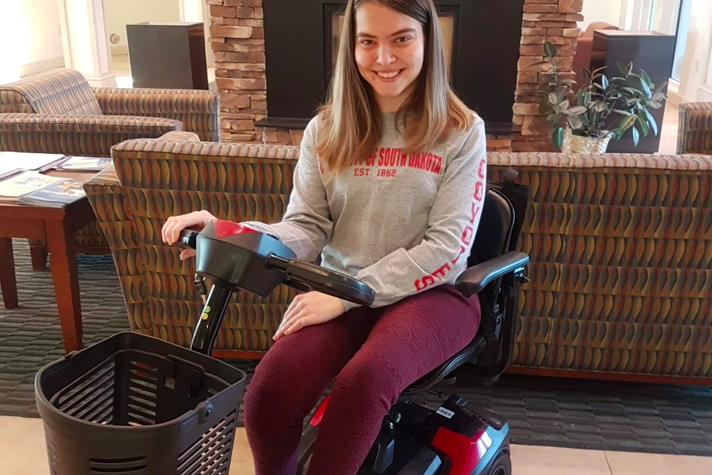
USD community supports campus accessibility
This is part two of a story about mobility and accessibility on USD’s campus.
For students with physical disabilities, everyday tasks like going to class or meeting with professors can seem daunting.
USD’s disabilities services, along with facilities management, aim to provide accessible buildings and facilities for all students. However, USD still has areas to improve.
A supportive community
Kseniia Kaminskaia, a sophomore media & journalism major, is an exchange student from Yekaterinburg, Russia. She said USD’s accessible campus played a large role in her exchange program’s decision to place her here.
“I’m an exchange student and we actually don’t choose the university we go to, but the organizers of the program choose it for us. I don’t know how they do this, but they absolutely took accessibility as a big factor,” she said. “In Russia, not all universities are accessible; it was a big problem for me to choose a good (university).”
While in the U.S., Kaminskaia said her scooter began to experience problems, and she made the decision to purchase a new one.
“My old scooter was broke a few days before winter break and I was planning on traveling. I was unable to go anywhere without the scooter, so I decided to buy a new one on Amazon,” she said. “I didn’t expect to pay such a large amount of money for a new scooter; I didn’t expect that the old one would break.”
After she explained the unexpected expense of her new scooter to her friends, Kaminskaia said they created a GoFundMe page for her cause.
“They just decided to open this page and they told the story about me, and they collected the money in less than a day,” she said. “I didn’t expect that it would work so well and the people would help so fast… I don’t even know who is most of the people who helped me; I really appreciate it.”
Kaminskaia said she hopes to show people from Russia what accessibility is like at USD and in the U.S.
“I’m planning a film about accessibility,” she said. “For my Russian audience, it would be interesting to see how my life is going here… I make a blog about life in the U.S and it would be a part of that, to show people the accessibility of USD.”
Plans to improve
Robert Oehler, associate vice president of facilities management, said it is law for new buildings and new renovations to meet current Americans with Disabilities Act (ADA) standards.
“There are several older buildings that are not fully accessible and have limited accommodations, these facilities will be updated as money is available for renovation,” Oehler said in an email interview with The Volante. “The North Complex Commons is presently under construction; the National Music Museum and the Center for Continuing Education will also be accessible when their renovations are completed.”
In addition to making plans to make buildings fully accessible, Ernetta Fox, director of disability services, said facilities management works to address unclear sidewalks very quickly.
“I think (a) thing USD does well is when a student does have physical access issues, we are able to address the problem very, very quickly,” Fox said. “If there’s a snow issue on campus, I can call facilities management and our facilities management is right there and ready to attack the snow.”
Hannah Hernes, a sophomore strategic communications major, uses a scooter to travel long distances across campus. She said facilities management does a good job at making sure sidewalks stay clear and accessible.
“(Facilities management) will come clear it, and there was actually one instance where I got stuck so I had to call UPD, but luckily right after I called them someone came and helped me,” she said. “But they’ve always been pretty good at clearing sidewalks and stuff.”
Kaminskaia said although USD is a very accessible campus, she has struggled with some sidewalks remaining uncleared.
“The biggest problem is the snow, so I’m glad there isn’t a lot right now,” she said. “Especially on my road between (Coyote Village) and campus, it’s a piece of the road that is not always clean.”

